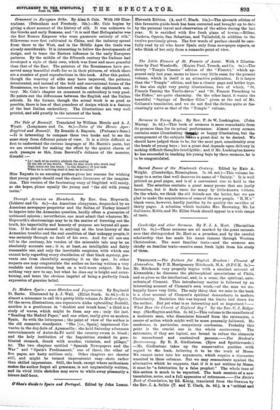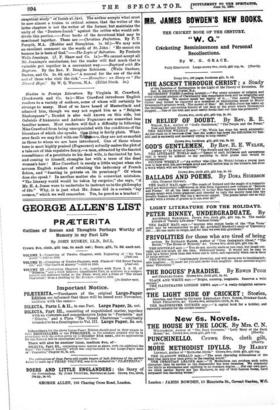THEOLOGY.—The Fathers for English Readers : Clement of Alexandria. By
F. R. Montgomery Hitchcock, M.A. (S.P.C.K. 3a.)— Mr. Hitchcock very properly begins with a succinct account of Alexandria ; he discusses the philosophical speculations of Philo, and so gives us the intellectual, and, in a sense, the spiritual, ante- cedents,of Clement. This introductory matter is followed by an interesting account of Clement's own work,—of the man we un- happily know very little. The only thing that we miss in the book is a clear account of Clement's spiritual descendants in modern Christianity. Doubtless this was beyond the limits laid down for the author. But yet what is so interesting and so important ?— lirkat Does the Church of England Say ? By the Rev. C. J. Ridge- way. (Skeffington and Son. 2s. 6d.)—This volume is the manifesto of a moderate man, who dissociates himself from the extremists, a course of action which might well be more generally followed.' He condemns, in particular, compulsory confession. Probably this point is the crucial one in the whole controversy. The extremists, if they are logical, are bound to refuse the elements to unconfessed and unabsolved persons.—The' Student's Deuteronomy. By R. B. Girdlestone. (Eyre and Spottiswoode.) —Mr. Girdlestone takes up the conservative position with regard to bhe book, believing it to be the work of Moses. We cannot enter into his arguments, which require a discussion unsuited to these columns. But we may remonstrate against the alternative which he suggests, that if it is not written by Moses, it must be "a fabrication by a false prophet." The whole tone of this section is much to be regretted. The book consists of a new translation, notes, and a full apparatus of references.—The Exile s Book cf Consolation, by Ed. Kfinig, translated from the German by the Rev, J. A. Selbie (T. and T. Clark, Ss. 6d.), is a "critical and exegetical accepts what must be now almost a truism in critical science, that the writer of the latter chapters is not the writer of the former, but maintains the unity of the "Dentero-Isaiah" against the critics who would sub- divide this portion.-Four books of the devotional kind may be mentioned together. These are :-Christian Perfection. By P. T. Forsyth, M.A. (Hodder and Stoughton. ls. 6d.)-We may note an excellent comment on the words of St. John : "He cannot sin because he is born of God."-The Logic of Salvation. By Frederic Wells Jennings. (J. F. Shaw and Co. ls.)-We cannot accept all Mr. Jennings's conclusions, but the reader will find much that is valuable put together in a convenient way. Baptised with His Baptism. By the Rev. F. Douglas Robinson. (Wells Gardner, Darton, and Co. 2s. 6d. net.)-" A manual for the use of the sick and of those who visit the sick."-Hereafter: an Essay on "The Blessed Hope." By W. Q. Warren, M.A. (Elliot Stock. 3s.)



















































 Previous page
Previous page